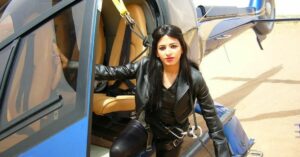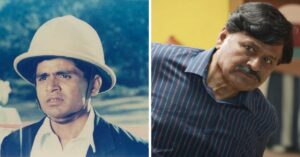‘Gehraiyaan’ Composer Wanted to Be a Physicist Before Music Took him To Bollywood
Kabeer Kathpalia, also known as 'OAFF,' found success with the movie ‘Gehraiyaan’. Here's how his unconventional path to music shaped his atmospheric pop style and collaborations with artists like Arijit Singh and Javed Akhtar.
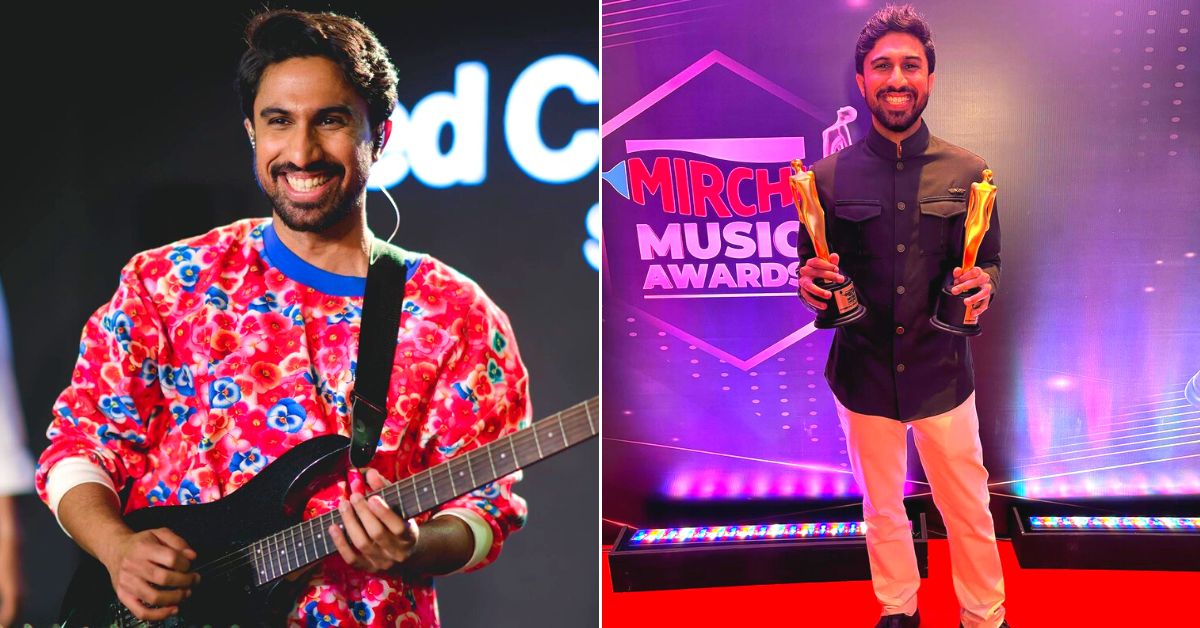
On 3 December, 2023, 34-year-old composer and producer Kabeer Kathpalia fulfilled a dream he had since college of performing at the NH7 Weekender music festival in Pune. Accompanied by his friend and longtime collaborator Savera Mehta and other artists on stage, Kabeer, who goes by the moniker ‘OAFF’, had his “full circle moment”.
“The NH7 Weekender experience was insane. Going to college in Pune, I attended some of the earliest Weekender festivals as a fan. Back then, I remember telling my friends that one day, I would play on this kind of a stage. For a while, it didn’t happen and I started doing other things including producing music. In 2022, Savera and I started performing live, and then, earlier this year, the Weekender organisers invited us to play,” says Kabeer, speaking to The Better India.
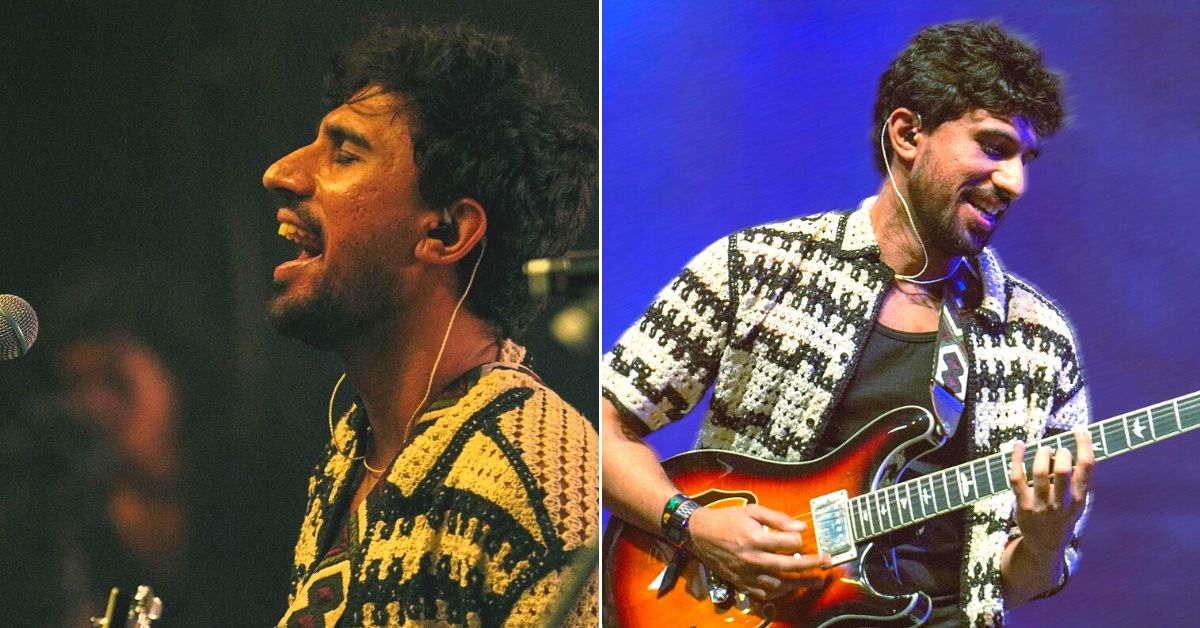
While on stage, Savera and OAFF performed their latest release ‘Hone Do Jo Hota Hai’ from the upcoming Netflix film ‘Kho Gaye Hum Kahan’ with fellow composer Ankur Tewari and actors Siddhant Chaturvedi, Ananya Pandey and Adarsh Gaurav who feature in it.
“It was a total party on stage! And, everything had come full circle,” he recalls.
Kabeer went from composing ad jingles for a few years to releasing his debut single in 2018 with Savera. Eventually, OAFF and Savera made a breakthrough in 2022 by composing the background score and soundtrack for the film ‘Gehraiyaan’ (starring Deepika Padukone).
Before delving further into Kabeer’s life and music, however, we asked him why he goes by the moniker ‘OAFF’. “The English word ‘oaff’ means a foolish, awkward and silly person. And when I started putting out music, I didn’t want to do it under my real name; I wanted an artistic name. Coming up with OAFF, however, was more of an inside joke between my friends and me. And I just related to that kind of a person, kept that as my stage name and it kind of stuck,” he says.
‘Music as a way to express things I can’t say with words’
Born and raised in Ahmedabad in a half-Punjabi and half-Gujarati family, Kabeer remembers growing up in a household filled with avid music listeners.
“My grandfather was a big music buff in terms of listening to Indian and Western classical music. Meanwhile, my father listened to a lot of Pink Floyd and The Beatles,” he recalls.
Kabeer recalls his parents putting him into different experimental schools. In fact, for two years (in Classes 6 and 7), he attended one such boarding school in Andhra Pradesh. Here, he recalls one of his core memories of getting into music.
“One of my core memories of getting into music came during my brief stint at this boarding school. In the evenings, I remember that while everyone was out playing different sports, I was indoors listening to the Pulse album by Pink Floyd and reading books. That’s such an abiding memory because somewhere down the line I started realising that music was a way for me to express things that I couldn’t say with words,” he recalls.
Following his two-year stint there, he went back to Ahmedabad and enrolled in an international school where he met Savera for the first time. Even though he didn’t know it then, this encounter and their subsequent friendship would change Kabeer’s life most remarkably.
“At school, Savera had an electric guitar, and one day, he allowed me to take it home and try my hand at it. We soon formed a punk rock band in high school playing cover songs. Once I started playing, I slowly started to immerse myself in studying music theory and trying to understand how things work,” he says.
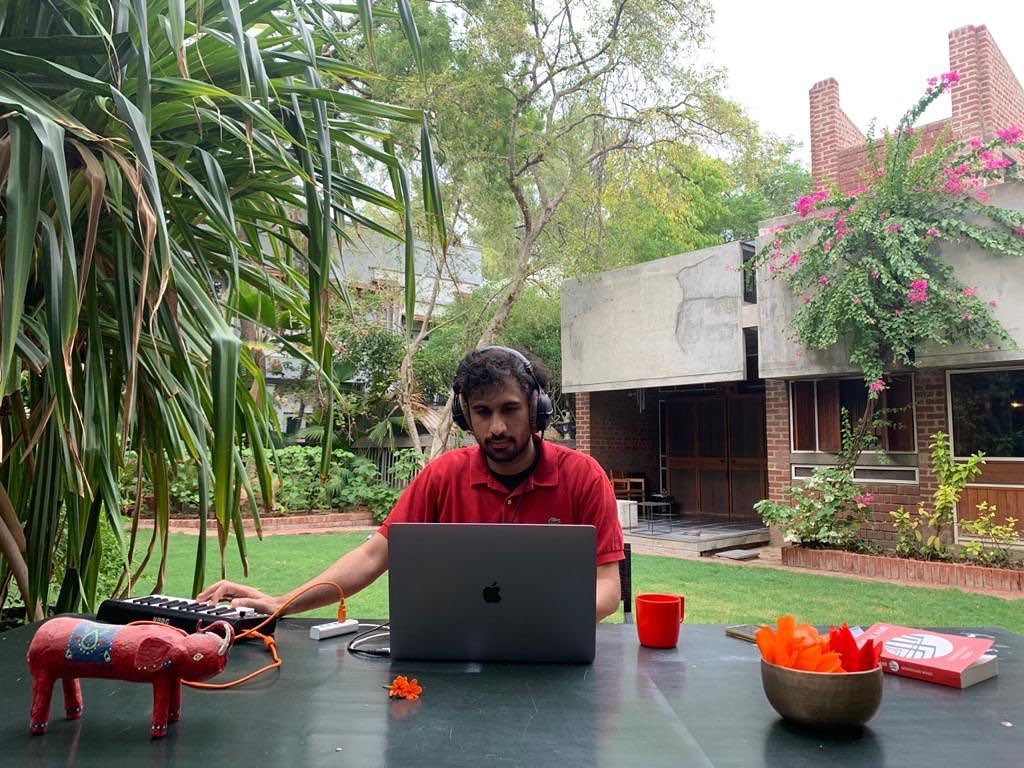
Moving between science and music
Following high school, Kabeer attended FLAME University, a private varsity in Pune, where he was studying mathematics and physics.
“Initially, I wanted to become a theoretical physicist. My years in college were mostly about science, particularly physics and mathematics. Besides these pursuits, the only other thing that really interested me in college was playing the guitar. Fortunately, I also met a bunch of friends in college who were really experimenting with music,” he says.
However, there was one friend in particular from Nagaland, who really helped Kabeer immerse himself further in music and experiment with different sounds.
“Kuzo (his friend) and I would jam and come up with all sorts of crazy ideas about music theory. But even at that point, music was something I did for fun. Once I got done with college, I told my parents that I wanted to take a year off to make my own music. Thankfully, they were cool with this decision. Kuzo and I soon started making music at a studio we had set up in Ahmedabad and started putting out our work on Facebook, SoundCloud, etc,” he says.
A turning point came when one day a brand approached Kabeer and his friend to make music for them for which they would receive remuneration.
“Eventually, this led to more such projects. Then I decided to make the move to Mumbai and see what the scene is like there. So, I made my way to Mumbai sometime around 2014–15. Even at this point, I didn’t think of myself as a musician or a composer. I was just glad that I was getting paid to make music. It was only a couple of years later down the line that I began to accept the fact that I’m a music composer and that this is what I do,” he notes.
In Mumbai, Kabeer once again found Savera, and they began by making ad jingles for brands.
“Honestly, I didn’t know how people made money through music but soon found out that people pay composers good money for ad jingles. Once a director gave me an ad to work on, and things just picked up. Before we knew it, Savera and I had composed hundreds of jingles,” he says.
Despite regular jam sessions and composing songs in their free time, it was only in 2018 when Kabeer (under the OAFF moniker) and Savera released their first independent song ‘For A While’.
What took him so long to put out his first song online?
“As most musicians who put out their music for the first time, you never feel it’s completely ready. There is always that feeling that you can do more. I had been thinking about putting out music for so many years and one day decided not to overthink it. So, I just dropped ‘For A While’ online and left it alone,” recalls Kabeer.
After releasing it, he forgot about the song. A couple of weeks later, a friend of his told him that the song had blown up on Spotify generating a good number of streams. Suffice to say, he was sceptical about the claims his friend had made. “Once I went on Spotify and checked the streaming numbers, it gave me greater confidence to put out more music,” he adds.
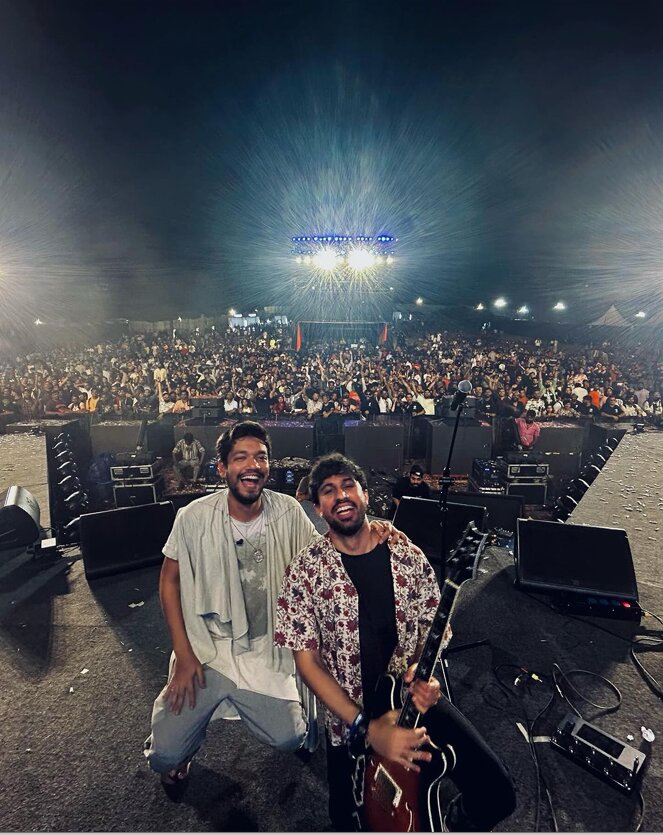
‘Gehraiyaan’
A couple of years earlier, Kabeer recalls having watched director Shakun Batra’s film Kapoor & Sons at the theatre and coming away from it thinking that one day he would love to compose music for his films.
“I came out of the theatre thinking he has such good taste [in music]. Fast forward to 2020 and I had released ‘Perpetuate’, an instrumental track. A year later, I got this direct message (DM) from Shakun Batra on Instagram asking me if I would meet him for this new project (Gehraiyaan) he was working on. I jumped at the chance to meet him,” he recalls.
“Shakun wanted Savera and me to do the background score for the film because he saw that the instrumental track [I had put out] fitted well into the sonic and emotional palette of music he was looking to explore for this film. Of course, he asked us for demos and did his due diligence on us to see whether we could handle a project of this magnitude,” he adds.
They got the background score gig, which was massive for them. But as Savera and Kabeer were doing the background score, they began wondering who was composing the songs.
“We asked him how Savera and I could compose songs for the film. He told us that composing songs was a little different proposition because it requires approval from the producer and that there were big composers pitching songs for the film too. But Shakun told us that if Savera and I could deliver songs while having the time and bandwidth to the score work as well, we should go for it. Savera and I decided that we should send him a song at least,” he says.
After coming up with a bunch of ideas, they sent a rough demo for what eventually became ‘Doobey’ — the standout track from the Gehraiyaan album — and it got approved. Shakun had also heard a song of Kabeer’s called ‘Frontline’, which later on became the title track ‘Gehraiyaan’.
“After sending in two songs, we asked if we could send in another one. Shakun responded by saying that we should do the whole album,” he adds.
Process of making music
“Essentially, we start off with a vibe we are trying to explore. We’ll mess around with our instruments and reach a point where we feel that this is an interesting vibe to explore. And then we’ll put down the melody, which would usually be in English,” he explains.
“Initially, we’ll sort of write an English pop song because that’s the kind of music we grew up listening to and it’s easier for us to phrase it in that [language]. We have this production with an English melody and then we present it to the director/producer. Once it gets approved, the lyricist comes in and then starts writing Hindi lyrics to the same English melody. This is a process in itself because every language has its own nuances,” he adds.
For a movie like Gehraiyaan, Kabeer explains that the background score and songs primarily serve the story and the characters. Given the fact that the movie does not have a conventional song-and-dance routine with actors dancing or lip-syncing to songs, the objective of making music here is about taking the story ahead. Since the background score has no lyrics, it’s about creating the tension a scene requires. A song, meanwhile, provides a different touch.
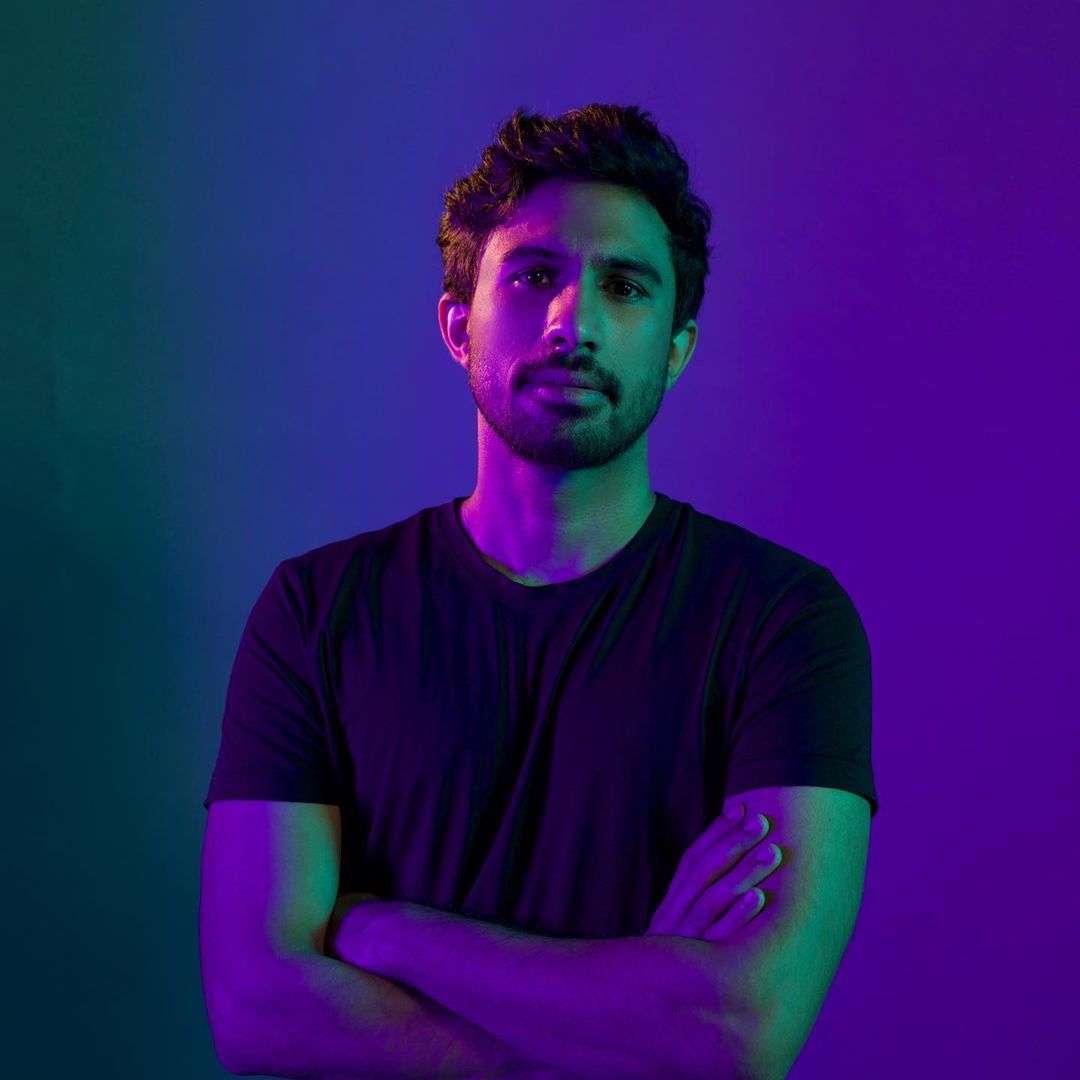
Two years since Gehraiyaan, however, their process of making music has changed a little bit.
“The way in which we have slightly altered our approach to making music is that now we have kind of understood the structure of [song] writing a little better. We are also actively trying to learn Hindi a little better so that we don’t have to do this English-to-Hindi thing every time. The other big difference is that Savera and I are not in the same city anymore. That process of sitting on the same laptop and doing things together doesn’t happen all the time,” he says.
Atmospheric Pop
Like most artists, Kabeer doesn’t like the notion that his music can be pigeonholed into a certain genre. But if we were to describe his music sensibility, he prefers the term ‘atmospheric pop’.
“On the one hand, I listen to a lot of instrumental music whether it’s just guitars or electronic music. I love that kind of music because of the introspective feeling it gives me. On the other hand, I also love pop music, understanding its dynamics, how to write a good hook and keep the audience engaged, etc. Initially, the goal was to combine both these elements into my music. Tracks like Gehraiyaan, Doobey and Bahaane have this electronica music sensibility in the production but it’s got pop song-writing as well. For the Netflix film ‘Kho Gaye Hum Kahan’ slated for release on 26 December, we’ve gone for a more indie rock vibe,” he explains.
“That’s not purely electronica music anymore, it’s something else now. It’s part of our evolution as artists. The idea is to do something new which hasn’t been explored sonically in Bollywood. We want to work with sounds that aren’t typically explored in Bollywood,” he adds.
Meanwhile, Kabeer’s recent success has given him the chance to collaborate with different artists including the likes of Arijit Singh and Javed Akhtar.
“The work I have done so far has now given me access to more people I want to collaborate with. But the holy grail is AR Rahman. Forget collaborating, I just want to meet him, see him work, and learn from him. I would love to understand his process of making music,” he says.
(Edited by Pranita Bhat; Images courtesy Instagram/oaffmusic)
If you found our stories insightful, informative, or even just enjoyable, we invite you to consider making a voluntary payment to support the work we do at The Better India. Your contribution helps us continue producing quality content that educates, inspires, and drives positive change. Choose one of the payment options below for your contribution- By paying for the stories you value, you directly contribute to sustaining our efforts focused on making a difference in the world. Together, let’s ensure that impactful stories continue to be told and shared, enriching lives and communities alike. Thank you for your support. Here are some frequently asked questions you might find helpful to know why you are contributing?

This story made me
-
97
-
121
-
89
-
167





